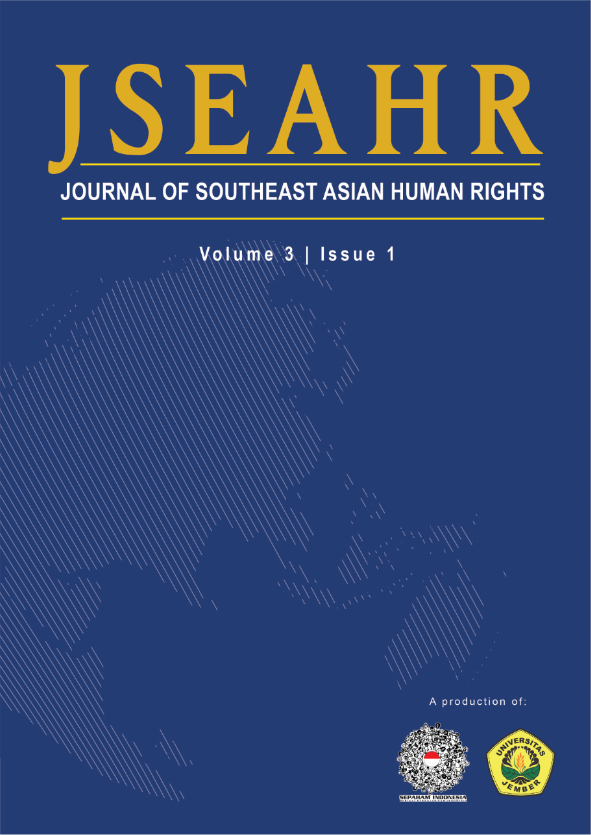A Cross-Cultural Comparison of Perceptions Regarding Human Trafficking
DOI:
https://doi.org/10.19184/jseahr.v3i1.9544Keywords:
Exploitation, Human Rights, Human Trafficking, SlaveryAbstract
This study surveyed 135 individuals, of which 68 were native speakers of English and 67 were native speakers of Thai. Respondents answered questions on issues related to human trafficking, its causes, and potential solutions. Statistical tests showed significant variance in opinions between language and other groups regarding factors associated with trafficking, and regarding the potential impacts of legalization of prostitution. Thai responses reflected collectivist cultural perceptions while English responses reflected more individualistic views. Males and English speakers were most likely to think legalized prostitution would lead to a reduction in human trafficking while females and Thais were most likely to believe legalized prostitution would increase trafficking. Responses to an open-ended question showed participants felt similarly about potential remedies for human trafficking, including information and awareness campaigns, interaction between civilians and police, increased penalties for offenders, and reduction in macro-environmental variables such as poverty.
Downloads
References
Bullard, G. (2016). The world’s newest major religion: No religion, online: <https://news.nationalgeographic.com/2016/04/160422-atheism-agnostic-secular-nones-rising-religion/>
Cho, Seo-Young, Dreher, Alex, & Neumayer, Eric, “Does Legalized Prostitution Increase Human Trafficking?†(2013) 41 J World Dev 67—82, online: <https://www.sciencedirect.com/science/article/pii/S0305750X12001453?via%3Dihub>
Hofstede Insights, “Country Comparison†(2019), online: <https://www.hofstede-insights.com/country-comparison/>
ILO, “Profits and Poverty: The Economics of Forced Laborâ€, (Geneva, Switzerland: International Labor Organization, 2014), online: <https://www.ilo.org/wcmsp5/groups/public/---ed_norm/---declaration/documents/publication/wcms_243391.pdf>
ILO, “Global Estimates of Modern Slavery: Forced Labor and Forced Marriage†(Geneva, Switzerland: International Labor Office, 2017), online: <https://www.ilo.org/global/publications/books/WCMS_575479/lang--en/index.htm>
Jakobsson, Niklas & Kotsadam, Andreas, “Gender Equity and Prostitution: An Investigation of Attitudes in Norway and Sweden†(2011) 17:1 J Fem Econ 31—58, online: <https://www.tandfonline.com/doi/full/10.1080/13545701.2010.541863>
Jiang, Wenying, “The Relationship between Culture and Languageâ€, 54:4 ELT J 328—334, online: <http://www.linguisticsnetwork.com/wp-content/uploads/The-relationship-between-culture-and-language.pdf>
Kirchner, Stephan & Frese, Vanessa, “Slavery under the European Convention on Human Rights and the Jus Cogens Prohibition of Human Trafficking†(2015) 27:1 Denning L J 130—145, online: <http://www.ubplj.org/index.php/dlj/article/view/1105/1018>
Krejcie, Robert & Morgan, Daryle, “Determining Sample Size for Research Activities†(1970) 30 Ed & Psych Meas 607—610, online: <https://home.kku.ac.th/sompong/guest_speaker/KrejcieandMorgan_article.pdf>
Lara Gerassi, “A Heated Debate: Theoretical Perspectives of Sexual Exploitation and Sex Work†(2016) 42:4 J Sociol Soc Welf 79—100, online: <https://www.ncbi.nlm.nih.gov/pmc/articles/PMC4730391/>
League of Nations, Convention to Suppress the Slave Trade and Slavery, 1926, 60 LNTS 253, art 4, online: <https://www.refworld.org/docid/3ae6b36fb.html>
Lee, Samuel & Persson, Petra, “Human Trafficking and Regulating Prostitution†(2018), online: <https://web.stanford.edu/~perssonp/Prostitution.pdf>
Lund Research, “One-way ANOVA†(2018), online: <https://statistics.laerd.com/statistical-guides/one-way-anova-statistical-guide-3.php>
Mace, Stephanie, “Child trafficking: A case study of the perceptions of child welfare professionals in Coloradoâ€, (Fort Collins, CO, USA: Colorado State University School of Education, 2013), online: <https://mountainscholar.org/bitstream/handle/10217/78834/Mace_colostate_0053A_11615.pdf?sequence=1&isAllowed=y>
Mahadi, Tengku & Jafari, Sepideh, “Language and Cultureâ€, 2:17 Int J of Hum & Soc Sci 230—235, online: <https://www.ijhssnet.com/journals/Vol_2_No_17_September_2012/24.pdf>
National Business Research Institute, “Sample Size Calculator†(2018), online: <https://www.nbrii.com/our-process/sample-size-calculator/>
Perez Solla, Maria, “Slavery and Human Trafficking: International Law and the Role of the World Bankâ€, SP Discussion Paper 0904, 2009, online: <https://siteresources.worldbank.org/SOCIALPROTECTION/Resources/SP-Discussion-papers/Labor-Market-DP/0904.pdf>
Pew Research Center, “Global Views on Morality†(2014), online: < http://www.pewglobal.org/2014/04/15/global-morality/table/homosexuality/>
Robinson, Jill, “Public perceptions of human trafficking in Moldova†(2011) 20:3 Psych Inter., 269—279, online: <https://ac.els-cdn.com/S1132055911700527/1-s2.0-S1132055911700527-main.pdf?_tid=c865aa80-d0c1-4946-a03b-3a21fcdf108e&acdnat=1549021744_b0eda250a7718b6c44b2c4aed315a535>
Robson, David, “How East and West Think in Profoundly Different Ways†BBC (19 January 2017), online: The BBC <http://www.bbc.com/future/story/20170118-how-east-and-west-think-in-profoundly-different-ways>
Sharapov, Kiril, “Understanding public knowledge and attitudes towards trafficking in human beingsâ€, Research Paper: Part 1, (Budapest, Hungary: Center for Policy Studies, Central European University, 2014), online: <http://lastradainternational.org/lsidocs/3119-Public-knowledge-and-attitudes-towards-thb-2014.pdf>
Shrage, Laurie, “Feminist Perspectives on Sex Markets†(2016) Stanford Encyclopedia of Philosophy, online: <https://plato.stanford.edu/entries/feminist-sex-markets/#Pros>
Stark, Taylor, “Does God Matter? Religion in Individualistic and Collectivistic Personalitiesâ€, (Hillsboro, OR, USA: Graduate School of Professional Psychology, Pacific University, 2009), online: <https://commons.pacificu.edu/cgi/viewcontent.cgi?referer=https://adguard.com/referrer.html&httpsredir=1&article=1201&context=spp>
UN General Assembly, United Nations Convention against Transnational Organized Crime, 2000, A/RES/55/25, online: <https://www.refworld.org/docid/3b00f55b0.html>
UN General Assembly, Universal Declaration of Human Rights, 1948, 217 A(III), online: <https://www.refworld.org/docid/3ae6b3712c.html>
UN General Assembly, Protocol to Prevent, Suppress and Punish Trafficking in Persons, Especially Women and Children, Supplementing the United Nations Convention against Transnational Organized Crime, 2000, art 3(a), online: <https://www.refworld.org/docid/4720706c0.html>
United States Department of State, Trafficking in Persons Report 2018, (Washington DC: Department of State, 2018) online: <https://www.state.gov/documents/organization/282798.pdf>
UNODC, “Global Report on Trafficking in Persons†(Vienna, Austria: UNODC, 2009), online: <http://www.unodc.org/documents/Global_Report_on_TIP.pdf>
UNODC, “Human Trafficking: Organized Crime and the Multibillion Dollar Sale of Peopleâ€, 2012, online: <http://www.unodc.org/unodc/en/frontpage/2012/July/human-trafficking_-organized-crime-and-the-multibillion-dollar-sale-of-people.html>
UNODC (United Nations Office on Drugs and Crime), Global Report on Trafficking in Persons, (Vienna: UNODC, 2016) online: UNODC <https://www.unodc.org/documents/data-and-analysis/glotip/2016_Global_Report_on_Trafficking_in_Persons.pdf>
Withers, Melissa, “Pimp Culture Glorification and Sex Traffickingâ€, online (2017) Psych Today <https://www.psychologytoday.com/us/blog/modern-day-slavery/201704/pimp-culture-glorification-and-sex-trafficking>
World Bank, “World Bank Country and Lending Groups†(2018), online: <https://datahelpdesk.worldbank.org/knowledgebase/articles/906519-world-bank-country-and-lending-groups>
World Bank, “GDP Ranking†(2018), online: <https://datacatalog.worldbank.org/dataset/gdp-ranking>







